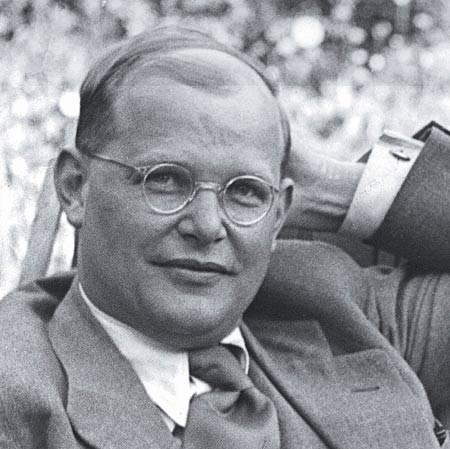Question 3.
Whence knowest thou thy misery?
Answer.
Out of the Law of God.
—–
As you consider this new film, remember that we have been here before. Remember that there are a lot of people hoping to make a lot of money from this film. Remember that God promises to bless the preaching of his Word, not the display of that Word on the silver screen. Don’t expect a movie to do the Word’s work.
Escaping the Prison of the Self: C.S. Lewis on Masturbation
For me the real evil of masturbation would be that it takes an appetite which, in lawful use, leads the individual out of himself to complete (and correct) his own personality in that of another (and finally in children and even grandchildren) and turns it back: sends the man back into the prison of himself, there to keep a harem of imaginary brides. And this harem, once admitted, works against his ever getting out and really uniting with a real woman. For the harem is always accessible, always subservient, calls for no sacrifices or adjustments, and can be endowed with erotic and psychological attractions which no real woman can rival. Among those shadowy brides he is always adored, always the perfect lover: no demand is made on his unselfishness, no mortification ever imposed on his vanity. In the end, they become merely the medium through which he increasingly adores himself…. And it is not only the faculty of love which is thus sterilized, forced back on itself, but also the faculty of imagination.
A Break-up Letter to Matt Walsh
And I don’t think reading your blog is helping with that. Whether I agree with you or not, all you do is make me mad. And what’s worse is, you’re funny and charming while you do it. You make me like being mad. And I don’t want to like being mad.
So, I feel terrible for doing this. But I’m breaking it off, before we get too serious.
And while this stool is hurling through the air towards the minister, Jenny Geddes is said to have called out, “The devil cause you colic in the stomach, false thief! Dare you speak the Mass in my ear?” Well, like I said, this is one of my favorite stories in church history. Wouldn’t you love to meet Jenny Geddes? They say there is a sculpture of the stool that she would have sat on there in St Giles’ as a memorial to her.
You see, when you admit your limits, you’re a humble and restful person. You’re humble enough to admit weakness, always open to learning. And you’re restful, because you know that control is in the hands of God – and not yours.
Have you ever tried honeysuckle?  Man when I was a kid I used to love tasting honeysuckle. If you’re not familiar with the plant, it is essentially a small white or yellow flower that produces small amounts of edible nectar that can be pulled out and eaten. Each individual flower hardly provides enough satisfaction, and so as kids it wasn’t uncommon for us to sit by honeysuckle bushes and eat nectar for 10, maybe 15 minutes at a time. It wasn’t that we thought it was real honey or anything, but it was tangible and reminded us of what the real thing was like. Each taste only left us longing for more.
Man when I was a kid I used to love tasting honeysuckle. If you’re not familiar with the plant, it is essentially a small white or yellow flower that produces small amounts of edible nectar that can be pulled out and eaten. Each individual flower hardly provides enough satisfaction, and so as kids it wasn’t uncommon for us to sit by honeysuckle bushes and eat nectar for 10, maybe 15 minutes at a time. It wasn’t that we thought it was real honey or anything, but it was tangible and reminded us of what the real thing was like. Each taste only left us longing for more.
Isn’t that what its like for us now in our communion with Christ? There are some days that go by where everything I do, whether its in prayer, reading the scriptures, sharing my faith with others, engaging in Christian fellowship and worship, participating in the church gathered; everything I do just leaves me longing for more. Experiencing the grace of God is so satisfying and never lacking. I just can’t get enough.
Other days are quite the opposite.
Some days feel more like a desert than sitting near a provision of his grace. There are some weeks where it feels so long since I’ve had just a drop – a small drop – of anything even remotely satisfying or quenching that I’m left desperate even for one microscopic taste of grace. Oh how I would desire just a taste! Oh God on those days would you just grant me one small drop of your grace again? Do not keep your presence far from me! As a deer pants for flowing streams, so pants my soul for you, O God! My soul thirsts for God, for the living God (Psalm 42:1-2)!
And this is his kindness toward us, that when we feel ourselves distant and in a drought, God is eager to once again lavish on us the taste of his goodness and grace. His Spirit cries out from within us, “taste and see that the Lord is good!” For those who are in Christ, God promises a river of living water (John 7:38) and bread that will never leave us hungry (John 6:35). Like the Israelites who ate manna in the wilderness, so too does God give us means of grace to nourish us on our pilgrimage.
There is a tension now in the reality of this life. As we look forward to the day when our cup will never be empty and our plates will always be full, in this life God has given us his means of grace to nourish and satisfy us. Every moment in prayer, every moment in the word, every moment gathered with the church, every time we partake in the Holy Communion is as if grasping for small tastes of something sweet and nourishing. Satisfied yet never full; delighted and always longing for more. Mere drops of what is to come with the flowing, endless rivers of joy, peace, love and grace.
From Dietrich Bonhoeffer in Tegel prison, to his fiance Maria von Wedemeyer.
—–
12 August 1943
My Dearest Maria,
After sending off my last letter to you, I was suddenly afraid that my Tegel address on the envelope might make trouble for you in the village. Although I can almost hear you laugh out loud at the idea – and I look forward to hearing you laugh – I don’t think such matters should be treated lightly. It really isn’t necessary for you to be subjected to village gossip about your fiance. And so, to preclude any such possibility, I didn’t write to you again but asked my parents how you felt about it. Today, however, your dear letter arrived, and I simply can’t remain silent. But please, next time tell me how I’m to write to you in the future. I won’t write again until I hear.
So now to your letter. You can’t possibly imagine what it means to me, in my present predicament, to have you. I’m under God’s special guidance here, I feel sure. To me, the way in which we found each other such a short time before my arrest seems a definite indication of that. Once again, things went “hominum confusione et dei providentia (according to man’s confusion and God’s providence).” It amazes me anew every day how little I have deserved such happiness, just as it daily and deeply moves me that God should have put you through such an ordeal this past year, and that he so clearly meant me to bring you grief and sorrow, so soon after we got to know each other, to endow our love with the proper foundation and the proper strength. Moreover, when I consider the state of the world, the total obscurity enshrouding our personal destiny, and my present imprisonment, our union – if it wasn’t frivolity, which it certainly wasn’t – can only be a token of God’s grace and goodness, which summon us to believe in him. We would have to be blind not to see that. When Jeremiah said, in his people’s hour of direst need, that “houses and fields [and vineyards] shall again be bought in this land,” it was a token of confidence in the future. That requires faith, and may God grant it to us daily. I don’t mean the faith that flees the world, but the faith that endures in the world and loves and remains true to that world in spite of all the hardships it brings us. Our marriage must be a “yes” to God’s earth. It must strengthen our resolve to do and accomplish something on earth. I fear that Christians who venture to stand on earth on only one leg will stand in heaven on only one leg too.
I’m thoroughly in favor of your pastor marrying us, but the way. In these matters I think would should always to the most obvious thing. That’s more important than any personal preference.
So now you’ve got the house full of people. How much I would have liked to see you running the household at this time! Your mother wrote me such a nice letter again, telling me all kinds of things. Please thank her very much indeed; I know what a sacrifice if must be for her to find the time to write to me. But there’s no greater pleasure in this place than getting letters from people. One rereads them innumerable times so as to share in their lives.
It’s a cloudy, rainy day outside, a perfect accompaniment to my fruitless wait for the situation to resolve itself. But let us never forget how much we have to be thankful for, and how much good we experience even so; I have only to think of you, and all the little shadows on my soul disperse. So let us continue to be really patient for the rest of the time we’re compelled to wait, and not waste a single hour grousing and grumbling. From God’s standpoint, this time of waiting is immensely valuable; much depends on how we endure it and on whether we need not feel ashamed, later on, of having failed to recognize these months of testing as a gift from God. I’m convinced that our love and our marriage will derive eternal strength from this time of trial. So let us wait, with and for each other, until our wedding day dawns. It won’t be much longer, my dear, dear Maria!
Please give my love to your mother and your brothers and sisters. Is it Lutgert who was killed in action? You must all be very sad. Please remember me to his wife. Good-bye, dearest Maria, and may God preserve us and our families.
Your Dietrich, who looks forward from one letter to the next, embraces you!
*I have cited it in the sources below, but I owe much of the inspiration and information for this post to Dr. Stephen Nichols book The Reformation.
—–
It is common in matters of Reformation Church History to primarily speak of these great figures and martyrs of its time: Luther, Calvin, Zwingli, Bullinger, Beza, Cranmer, Knox, Cromwell, Bunyan, etc. Do you notice one thing in common with all of these names? It is not that they’re all White Europeans or that they had epic beards; no, the trait all of these names have in common are that they all belong to men.
Did you know that there are great heroines of the Reformation? While fewer in number their heart, bold speech and mighty actions equal, rival and often tower over the men of their time. There is one woman in particular whose actions warm my heart, stir my affections for Jesus and stand out as a mighty figure in church history.
But before we can address this great heroine of the Reformation, we must first take a step back in time to tell the soap opera tale of a certain English king and his ill-suited Queens – all seven of them.
King of Queens
King Henry VIII was a king known for his devout and persistent Roman Catholic faith. He was not only a king, but was known for being something of a theologian; in 1521 he refuted Martin Luther and defended Roman Catholic theology in a book entitled The Defense of the Seven Sacraments. The pope at the time, Leo X, praised Henry and gave him the title of “Defender of the Faith.” So long as Henry was on the throne, it appeared impossible for the German or Swiss Reformation to come anywhere near England.
But all was not as it seemed. Henry was married to his first wife Catherine, and after six children (only one of which survived, Mary – remember her for later), Henry was not satisfied without having a male heir. Seeking this heir, he wanted an annulment from Catherine, something the Roman church was either not willing to provide or was taking too long to decide.
Enter Thomas Cranmer: the Archbishop of Canterbury and a man influenced by the turning tides of the Reformation who sought deep reform in England. Seizing the opportunity, Cranmer influenced Henry and told him that he would grant him annulment if Henry would break from the pope and the Roman Catholic church.
In 1534 Henry and Parliament signed and declared the Act of Supremacy, officially breaking from all papal and Roman authority. It is for this reason the first 14 years of the English Reformation is often called the Henrician Reformation. Henry had already married Anne Boleyn, who also failed to produce a male heir. Instead, her only surviving child was another daughter, Elizabeth. Cranmer was soon called upon to annul another marriage and Queen Anne was beheaded. Henry married Jane Seymour, who died giving birth to Henry’s only son Edward. The King then married Anne of Cleeves, and that marriage was soon annulled. His next marriage was to Catherine Howard, who had affairs and was tried and beheaded for treason. Henry’s last marriage was to Catherine Parr in 1543. He died four years later.
King Edward VI, then nine-years-old was put on the throne. Edward was a sickly child, and being only nine years in age, Cranmer was able to use the time of Edwards rule to push for the most serious of reforms. King Edward died a few years later in 1553.
My Heroine, Lady Jane Grey
This is where things get even more interesting. During the latter portion of Henry’s rule, England had distanced itself from Rome by abolishing Papal authority and either purchasing or destroying Rome’s many monasteries and churches. While Edward was on the throne and Cranmer pushed for sweeping reforms, England became known as being much more Protestant than Roman Catholic. The problem was that the next heir to the throne was Mary, from Henry’s second marriage. Mary was Roman Catholic in her DNA, so her ascent to the throne threatened to dismantle the Reformation that had taken hold in Britain.
Those committed to the cause of the Reformation entered into a political frenzy. Their plan was to halt the ascension of Mary by instead putting King Henry’s grandniece Lady Jane Grey on the throne. She was only sixteen years in age.
However committed to the Reformation England was, they were more committed to the royal blood-right of kings, so this political maneuver did not end well for Lady Jane nor her followers. Immediately following Lady Jane Grey’s placement on the throne as queen, Mary and her followers overcame the small resistance in support of Lady Jane and had them all arrested. But Lady Jane Grey was not your average sixteen-year-old teenage girl. Grey was highly trained and educated, especially in Biblical studies. She knew the original languages, and corresponded regularly with the leading Swiss Reformer Heinrich Bullinger.
Can you imagine? Lady Jane lived in a time where very few women had any kind of education, but to be this specialized? As we will see, Lady Jane could keep up with the best of the Reformation theologians. Whats more, not only was she highly and uniquely trained as a sixteen year old girl (or for anyone for that matter), but she did not merely posses head knowledge but was very mature in her passion and heart for Jesus as well. Look at what she wrote to her sister Catherine shortly after her arrest:
I have here sent you, Good sister Catherine, a book, which although it be not outwardly trimmed with gold, yet inwardly it is worth more than precious stones. It is the book, dear sister, of the law of the Lord…
Rejoice in Christ, as I do. Follow the steps of your master Christ, and take up your cross. Lay your sins on his back, and always embrace him. And as touching my death, rejoice as I do, good sister, that I shall be delivered of this corruption, and put on incorruption. For I am assured, that I shall, for losing of a mortal life, win an immortal life.
Unfortunately, “Bloody Mary” is not just the name of a tasty cocktail but was the name given to this Queen Mary who had arrested our dear Lady Jane. Sensing that Lady Jane was nothing more than a pawn in a political scheme, she offered life and peace to Grey by giving her the option of participating in Roman Mass. If she would but partake, Mary would give her life instead of condemn her. Being only sixteen, you’d think Lady Jane would delight at such an offer. But the cost was too high for our heroine. Jane Grey was so appalled at the thought of converting back to Catholicism that she chastised her former tutor and family chaplain at the news that they had converted back to Catholicism:
How canst thou having knowledge, or how darest thou neglect the law of The Lord, and follow vain traditions of men? And whereas thou hast become a public professor of his name, become now a defacer of his glory. I will not refuse the true God, and worship the invention of man, the golden calf, the whore of Babylon, the romish religion, the abominable idol, the wicked mass: wilt thou torment again, rend and tear the most precious body of our Savior Christ with thy bodily and fleshly teeth without the breaking whereof upon the cross, our sins and transgressions, could else no way be redeemed? Wilt thou take upon thee to offer up any sacrifice unto God for our sins, considering that Christ offered up himself upon the cross, a lovely sacrifice once for all?
Lady Jane was soon quizzed by Mary’s archbishop, Feckenham. Jane stood up against his challenges of the teachings of Scripture and the principles of the Reformation. Trying to trick Jane on the issue of justification, Feckenham said this: “It is necessary unto salvation to do good works also; it is not sufficient only to believe.” Lady Jane responded with an articulation of the doctrine of justification that would make Luther tremble:
I deny that, and I affirm that only faith saves; but it is meet for a Christian to do good works, in token that he follows the steps of his Master, Christ, yet may we not say that we profit to our salvation; for when we have done all, we are unprofitable servants and faith only in Christ’s blood saves us.
Lady Jane Grey was only on the throne for nine days, and was executed a few months after arrest shortly after her seventeenth birthday. Now known as the nine-day queen, she was martyred for her beliefs on February 12, 1554. Her last words on the scaffold were: I here die a true Christian woman and I trust to be saved by the blood of Christ, and by none other means.
Lady Jane might not have accomplished as much as some of the titans of the Reformation, but her faith in adversity was uniquely powered by the work of the Holy Spirit in her life. Grey’s dedication to a strong head and an even softer heart provides a model for all Christians. Her boldness and desire to know Christ intimately – even at such a young age, even amidst the immense difficulties for a seventeen-year-old girl to obtain such an education – is inspiring to us today.
Semper Reformanda
—–
Sources:
Collinson, Patrick. The Reformation: a History (Modern Library Chronicles). new york: Modern Library, 2006.
Foxe, John. Foxe’s Book of Martyrs. Orlando, FL: Bridge-Logos, 2007.
Nichols, Stephen J. The Reformation: How a Monk and a Mallet Changed the World. Wheaton, IL: Crossway, 2007.





